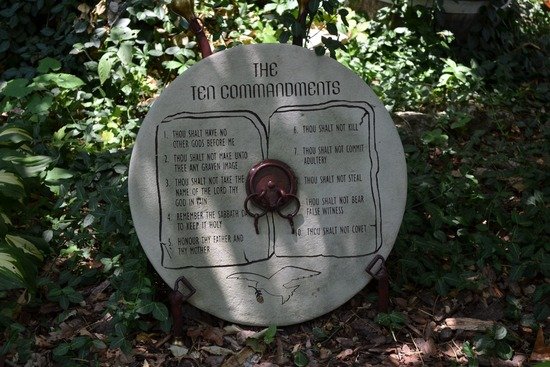Like most Protestant Christians, Seventh-day Adventists believe in God the Father as part of the Godhead. We call Him Father because of His role towards Jesus. Jesus Himself encouraged us to also call Him Father.
God the Father embodies love in its fullest sense and shows that love in the way He cares for us.
Ready to know more about Him through the Bible’s teachings?
We’ll look at:
- Why we call Him God the Father
- His roles
- His character
- How to understand His wrath
- A story that illustrates His love
As we begin our journey to understand God the Father better, here’s a summary statement from the Seventh-day Adventist fundamental beliefs:
“God the eternal Father is the Creator, Source, Sustainer, and Sovereign of all creation.
He is just and holy, merciful and gracious, slow to anger, and abounding in steadfast love and faithfulness.
The qualities and powers exhibited in the Son and the Holy Spirit are also those of the Father.”
Now, let’s go deeper.
Why is God called “the Father”?
The fatherhood portrayal of God is most prominent in the New Testament, where Jesus encourages us to relate to God as “our Father” (Matthew 6:9). But Jesus’ instructions are a continuation of the Old Testament, where the fatherhood of God is used to express His promise to care for, provide for, and save His people.1
It starts with the concept of covenant.
In Genesis 3, God made a covenant (similar to a contract or promise) with His people to send them His only begotten Son who would be a Deliverer from sin (Genesis 3:15).
Always, a son was chosen to represent that father and son relationship of the covenant between God and His people. It looked forward to Jesus Christ, who would fulfill the role as the Son of God and deliverer.
The covenant was passed down from generation to generation.
Isaac was the promised son of Abraham. And Jacob was the son who carried on the covenant with God.
Then the people of Israel took that role. God referred to them as His son whom He would bring out of Egypt (Exodus 4:22–23). And just like a loving father, God exercised His care and discipline for them (Deuteronomy 1:31; 8:5).
The Bible writers continued this theme in later books of the Old Testament, too (Psalm 103:13; Isaiah 63:16).2
Then, in the New Testament, Jesus constantly referred to God as Father.
He showed us that we could do the same. Through Jesus, God adopts us into His family so that we can be His covenant children and call Him “Abba Father” (Romans 8:14–16). John even writes:
“Behold what manner of love the Father has bestowed on us, that we should be called children of God!” (1 John 3:1, NKJV).
What is the role of God the Father?
 According to the Scriptures, God the Father is the first person of the Trinity (Godhead). He is the creator of the earth and the sustainer of all life.3 He cares for and saves His people in the same way a loving father would care for his children.
According to the Scriptures, God the Father is the first person of the Trinity (Godhead). He is the creator of the earth and the sustainer of all life.3 He cares for and saves His people in the same way a loving father would care for his children.
Though all members of the Godhead, or Trinity, are one God (Deuteronomy 6:5), the apostle Paul makes a clear distinction between God the Father and God the Son (Jesus):
“Yet for us there is one God, the Father, of whom are all things…and one Lord Jesus Christ, through whom are all things, and through whom we live” (1 Corinthians 8:6, NKJV).
Over and over, God the Father is also depicted as our creator (Genesis 2:1). He created the earth together with Jesus (John 1:1).
“Have we not all one Father? Has not one God created us?” (Malachi 2:10, NKJV).
“Through faith we understand that the worlds were framed by the Word of God, so that things which are seen were not made of things which do appear” (Hebrews 11:3, NKJV).
“Worthy are You, our Lord and God, to receive glory and honor and power, for You created all things, and by Your will they existed and were created” (Revelation 4:11, NKJV).
Beyond creating us, He is also our sustainer.
“Whatever the Lord pleases, He does, in heaven and on earth, in the seas and all deeps. He it is who makes the clouds rise at the end of the earth, who makes lightnings for the rain and brings forth the wind from His storehouses” (Psalm 135:6–7, ESV).
Adventists understand that God the Father didn’t just create the universe and leave it to run on its own. Instead, He’s directly involved in our world.
He knows all the stars by name—all the hundreds of billions of them (Psalm 147:4).
He has “fearfully and wonderfully” made each of us (Psalm 139:14, NKJV). And He even knows the number of hairs on our heads (Matthew 10:30).
But more than just knowing about us, He cares deeply for us! His personal love for us led Him to plan a way to save us from sin (John 3:16; 1 Peter 1:20). That love reaches us and draws us to Him so that we can receive salvation (Jeremiah 31:3; Hosea 2:14).
And that same love is who God is at His very core.
What is the character of God the Father?
God is self-sacrificing love (1 John 4:8). Every other characteristic of His—mercy, patience, justice, faithfulness—is just the outflow of this love.
If you open up your Bible to 1 John 4:8, you’ll notice that God isn’t “loving,” as though it’s a characteristic that describes Him. Rather, it’s who He is.
And it’s not the kind of mushy, fleeting love we often think of.
First Corinthians 13:4–7 defines love (and the character of God) as:
- Patient
- Kind
- Humble
- Considerate
- Unselfish
- Forgiving
- Rejoicing in the truth
- Bearing all things
- Believing all things
- Hoping all things
- Enduring all things
The Old Testament also portrays God the Father in this way. One of the most powerful revelations of His character occurred when He appeared to Moses:
“The Lord passed before him and proclaimed, ‘The Lord, the Lord, a God merciful and gracious, slow to anger, and abounding in steadfast love and faithfulness, keeping steadfast love for thousands, forgiving iniquity and transgression and sin’” (Exodus 34:6–7, ESV, emphasis added).
Abounding in steadfast love. Merciful and gracious.
These traits describe a truly loving and faithful father figure.
But how do we reconcile this picture of a loving God with the parts of the Old Testament that mention His wrath?
How do we understand the wrath of God in the Old Testament?
God is unchanging. Who He was in the Old Testament is also who He was in the New Testament. And who He is today. That includes His character of steadfast love. To reconcile this character with accounts of His wrath, we need to consider three things:
1. Jesus reveals God the Father to us.
2. God the Father is handling evil in the best way possible to bring it to an end.
3. He can’t stand to see injustice or pain inflicted on His children.
Keep reading to go deeper on each of these points.
Jesus reveals God the Father to us

Photo by Thomas Kinto on Unsplash
As we read the Old Testament, we have to remind ourselves that the character of God the Father there is the same as the character of Jesus.
In His life on earth, Jesus came to reveal God to humans and clear away misconceptions about Him.
Some people—especially secular critics of the Bible—depict God the Father of the Old Testament as angry and vindictive.
But Adventists instead turn to Jesus’ example to learn who God the Father really is.
When Jesus was preparing His followers for His soon departure, He reminded them:
“He who has seen Me has seen the Father” (John 14:9, NKJV).
That’s an amazing statement. In other words, Jesus and the Father are the same in character.
Years later, the apostle Paul expressed it like this:
“For in Him [Jesus] dwells all the fullness of the Godhead bodily” (Colossians 2:9, NKJV).
Jesus is a physical, human expression of the entire Godhead—the Father, Son, and Holy Spirit.
God the Father is handling evil in the best way possible to bring it to an end
Since Adam and Eve’s choice to disobey God (Genesis 3), humans have had to deal with the reality of evil in this world.
God has also had to face this reality. The way evil harms His children breaks His heart.
His ideal is a world of harmony, perfection, and peace. That’s what the Garden of Eden was like before sin (Genesis 2), and that’s what He’ll restore our world to someday (Revelation 21–22).
So, everything that we see in between in our Bibles is just God handling evil in the best way possible—to ultimately bring it to an end.
For example, when God sent the worldwide flood, He did so not because He wanted to destroy the world but because He saw that the inhabitants were incredibly evil and violent with no desire for repentance or a change of heart.
This grieved Him (Genesis 6:5)! By instructing Noah to build an ark, He provided a way to preserve His followers while bringing an end to those who could hurt them. What seemed like His wrath and judgment was also Him protecting His people so that the plan of salvation could be fulfilled.
Furthermore, as an omniscient God, He knew people’s hearts and understood where they were coming from. He also understood when people had chosen to deny Him so clearly that there wasn’t any way they’d turn back to Him.
Thus, what may seem like His wrath to us could actually have been a mercy to those who were headed for self-destruction by their actions. In the end, those who were destroyed made the choice for their own destruction.
Another situation in which God may have seemed harsh is the way He dealt with the Israelites.
Keep in mind that the Israelites were a nation that had been enslaved for many years. They had lost sight of God’s plan and were spiritually immature, so He had to be very literal and stern with them. God is meeting the children of Israel where they are, not being arbitrary or vindictive. This is also the reason why He gave them so many specific laws in the Torah.
And despite God’s sternness, He also had so much patience and mercy with them, even though they continued to doubt, complain, and rebel against Him (Psalm 78:8–39).
We see this in the book of Exodus, where God describes Himself to Moses:
“The Lord, the Lord God, merciful and gracious, longsuffering, and abounding in goodness and truth, keeping mercy for thousands, forgiving iniquity and transgression and sin, by no means clearing the guilty…” (Exodus 34:6-7, NKJV).
God’s love is abundant and He is merciful. He is also just. Whenever we see examples in the Bible that seem like God is being strange and violent to us, we must remember that not only does God understand the bigger picture in a different way than we humans do (Isaiah 55: 8-9), but that God’s expressions and emotions are completely just.
That doesn’t mean that these things don’t hurt Him. This whole process has cost Him agony and pain, even the death of His Son Jesus Christ. God suffers alongside us every time.
So it’s important to consider that His wrath also fits in with how He is going to end agony, pain, and evil.
He can’t stand to see injustice or pain inflicted on His children
God’s wrath is nothing like human anger. It’s not irrational or selfish. The only things that trigger His wrath are things that can hurt or hinder humans on their path to reconciliation with Him.
Jesus Himself also expressed wrath, showing us the kind of things God gets angry about.
Early in His ministry, Jesus visited the sacred temple in Jerusalem, the place where people came to pray, worship God, and offer animal sacrifices.
But unfortunately, it had become more of a place of shady business rather than a holy sanctuary. Here’s what happened:
“Now the Passover of the Jews was at hand, and Jesus went up to Jerusalem. And He found in the temple those who sold oxen and sheep and doves, and the money changers doing business.
When He had made a whip of cords, He drove them all out of the temple, with the sheep and the oxen, and poured out the changers’ money and overturned the tables.
And He said to those who sold doves, ‘Take these things away! Do not make My Father’s house a house of merchandise!’” (John 2:13–16, NKJV).
He used a whip of cords and overturned the tables. Anything that needed to be done to stop the misrepresentation of true worship and stop sincere worshippers from being taken advantage of.
Similarly, God the Father gets angry when people are exploited or hurt by others. Injustice incites His wrath.
Many Bible verses talk about God’s warning of judgment (His wrath) on those who hurt or oppress the poor, the weakest, and the most vulnerable.
“Then I will draw near to you for judgment. I will be a swift witness against the sorcerers, against the adulterers, against those who swear falsely, against those who oppress the hired worker in his wages, the widow and the fatherless, against those who thrust aside the sojourner, and do not fear Me, says the Lord of hosts” (Malachi 3:5, NKJV).4
In short, we could say that God the Father is the true warrior for social justice—and in the very best sense because He is motivated by pure love for the entire human race.
It was God the Father who sent His Son Jesus to the world—because He loves us (John 3:16).
And His wrath is a direct result of that love as well.
Think of it this way:
What loving earthly father wouldn’t become angry at someone or something that is hurting his children?
Our world is a painful place. A world filled with violence, destruction, death—all brought about by sin (Genesis 3:14; Romans 5:12).
God despises sin. And He especially despises what it makes people do. Sin is the only thing that can stir up God’s wrath. Which is why He wants to save all humanity from its eternal consequences (John 3:17).
And because of His desire to save us, He is also incredibly merciful—something we see in a parable Jesus told.
What does the parable of the prodigal son teach about the character of God?

Photo by August de Richelieu
Jesus shared a story that reveals God’s love for us and longing to save us.
He told about the spoiled son of a wealthy and loving father. This son wanted his share of his father’s inheritance early, and after getting it, he took off.
The young man was having a great time, partying hard.
That is, until the inheritance ran out.
And his friends left just as quickly as his money. An economic crash didn’t help either, making it even more difficult to survive.
Finally, he came to his senses and thought, “My father’s hired servants have bread enough and to spare, and I perish with hunger” (Luke 15:17, NKJV).
Desperate, he decided to return home. He was willing to tell his father he would work as a servant since he believed he was no longer worthy to be called a son (Luke 15:21).
How did his father respond?
Did he say, “Well, you reap what you sow” or “You can come back, but you’re going to have to prove your sincerity to me?”
No.
Jesus said that when the father saw the boy from a long way away, he “had compassion, and ran and fell on his neck and kissed him” (Luke 15:20, NKJV).
The father—a symbol of God the Father—even made a feast for his son who had finally returned home.
Like the father in the story, God the Father loves us and wants us even when we have insulted Him and strayed away from Him.
No resentment. No hurt pride.
Only a deep desire that no one would “perish, but all to come to repentance” (2 Peter 3:9, NKJV).
Understanding the true character of God the Father is freeing
Satan has painted God the Father as selfish, vindictive, and harsh. He’s worked hard to prevent us from seeing God for who He is.
He’s tried to get us to believe in a God that makes us want to run away or cower in fear.
But understanding God for who He is—a God of such deep love for us—is freeing.
It frees us to love Him back, to trust Him, and allow Him to help us live the life He designed us to live.
In our mess of a world, we can know that God understands, and it pains Him too. Through every circumstance, we can hold onto Him and know that He is working out the best possible world for us.
- Goran, Medved, “The Fatherhood of God in the Old Testament.” [↵]
- Isaiah 64:8; Jeremiah 31:9. [↵]
- John 6:27; 1 Corinthians 8:6; Galatians 1:3; 1 Peter 1:2. [↵]
- Jeremiah 23:12; Isaiah 10:1–3. [↵]
Related Articles
More Answers
What Do Seventh-day Adventists Believe about God the Son?
Seventh-day Adventists believe that Jesus is fully God as one of the members of the Trinity together with God the Father and the Holy Spirit. He plays a central role in it.
What do Seventh-day Adventists Believe about Creation?
Seventh-day Adventists believe that God is the creator of our world. They come to this conclusion from the first book of the Bible—Genesis. The account there tells us that God took six literal days to form the earth and all it contains, including us humans.
What do Seventh-day Adventists Believe about Sin and the Nature of Humanity
Seventh-day Adventists believe that humanity was created perfect and that, at our very core, we crave this kind of perfection and unity with God. But unfortunately, the Bible teaches that we chose to be wise in our own eyes and disobey God, which led to a natural tendency to be sinful, evil, and selfish.
Didn’t find your answer? Ask us!
We understand your concern of having questions but not knowing who to ask—we’ve felt it ourselves. When you’re ready to learn more about Adventists, send us a question! We know a thing or two about Adventists.






